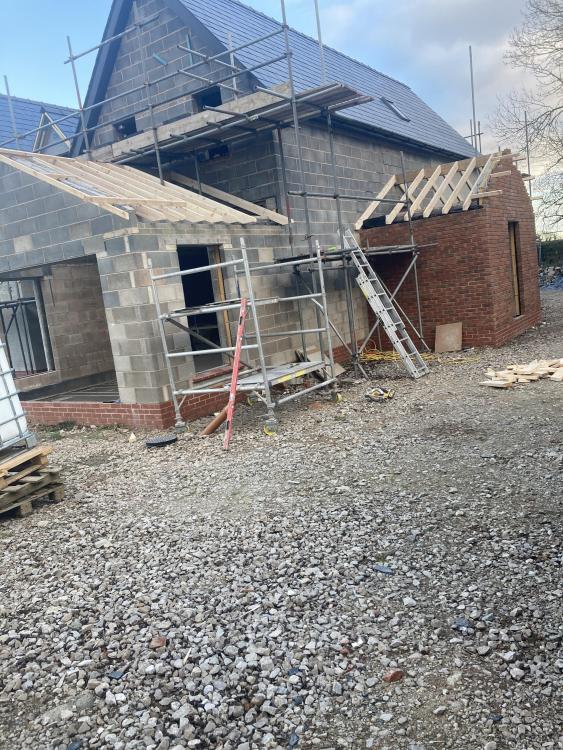Leaderboard
Popular Content
Showing content with the highest reputation on 02/26/23 in all areas
-
2 points
-
We have discovered that some of our 2G windows are draughty. The draught is coming in at the corner of the openable frames. Quite disappointed given these windows were very expensive and marketed as highly energy efficient. I’m going to raise this with the suppliers (who also did the install), but I’m just wondering how easy it is to fix this without using those unsightly aftermarket products. Windows were installed about 18 months ago, and I suspect the problem has been there from the beginning.1 point
-
There is often confusion, even within the industry, with regards geothermal and ground source. The terms are starting to become interchangeable, but I remember when Geothermal required at least a 500m borehole, and probably more, to get down to rock that was being heated by the earth's core, rather than solar energy. Unless you happen to have a hot spring emerging on your plot, when you could go without the borehole. Ground source is of course absorbing energy from the ground, or water that is heated by the sun. Typically GSHPs have lower day-to-day running costs, but are much more to install and a little more to maintain. With the demise of RHI, I can't see there ever being a cost benefit of GSHP over ASHP. Only if the ground arrays are incorrectly sized, which does seem to be the case with a reasonable number of early installs.1 point
-
1 point
-
I'm in Kent and might be able to help. Where in Kent roughly? I've three uPVC doors / frames here I bought cheap, s/hand. Need to double check which one I need to use. They all I think open out with the hinge the other side to your pictures.1 point
-
1 point
-
Iron wax gloss is good but not sure how it will like the heat of the stove but if it’s only a small amount you can always redo it regularly1 point
-
Correct. If the ground was porous sand/gravel with a flow of groundwater then the cooled water would be replaced by warmer. In heavy clay or rock there is no significant replenishment and it gets cold then freezes.1 point
-
That's right, I've never felt any. I guess it's enough just to turn off the fan. The dehumidifier function on my Daikin Emura's must perform a similar cycle (cooling) but having just tried it, there is a little bit of cool air movement which is to be expected.1 point
-
We settled on Phos eyeconic in the "nice" areas which generally work great, and Philips GU10 elsewhere. The Philips don't dim to such low levels and the phos flicker when the house is running off the battery (but fine when importing from grid). So yeah, I'd use less mains dimming if I could do it all again. Sorry think I came across more snarky than intended, I meant if you're actively looking for suggestions on what to buy I'll find the exact links. I'm a big fan of DIN mounted DMX controlled constant current drivers, these seem the sweatspot on price, efficiency and quality of dimming, but some manufacturers get pissy if supplying your own drivers. (not something that bothered me on my own build, but now I'm spec'ing this for others I have more culpability to think of)1 point
-
Which is crazy as in 10+ years time the system might have been completely replaced, upgraded, anything, all with bootleg and DIY work, but the white mark still sits there in the MCS database for perpetuity indicating this is a blessed address that may receive export payments I'm sure there's some clause saying you should notify them if making non-certified alterations, but if you bought the house since the changes you'd have no idea at all of the actual provenance of the install. Also: I'll laugh my socks off when MCS get held up to randomware and lose their DB. Yes agree just showing the certificate of the equipment installed should be sufficient (although logically you should show that to the DNO when notifying them of connection, regardless of export payment)1 point
-
I think Panasonic made a big thing on how their unit doesn't switch the internal unit off during defrost. So most likely most will pause the internal unit while defrost occurs.1 point
-
I rarely notice when defrosting is taking place so it's hard to say anything useful. It does make some interesting sounds at the indoor units though. Nothing about the external appearance of these changes (flaps stay in he same positions) but it only seems to happen when they're not blowing air around. I don't know if they stop blowing to do the defrost or wait for an opportune moment. Now you've brought this up I'll be paying more attention 😀1 point
-
If you are losing pressure from the system I would look for the cause of this. Adding leak sealer is just putting a band aid over the wound. Leak sealer has always been considered a last resort. When topping up the system pressure 2.1 bar is generally too high. Anything from 0.7 to 1.2 bar is normal system pressure when cold. Has your heating man checked that non of the air vents are leaking, expansion vessel pressure is good (is the expansion vessel sized correctly for the system volume), prv is not letting by etc. Are there any weeps inside the boiler or on any of the pipework and joints. Check all the above before adding leak sealer.1 point
-
We have Dantherm MVHR units, nothing fancy and do the job just fine. I don't even use the auto humidity sensors, nor do I use the different timed programmes, I found that they always ran faster when it was damp outside. I just set them on the lowest setting and leave them. I did have to turn them up when we had 9 people staying in the summer as the house got too hot.1 point
-
1 point
-
Our fan unit is quite noisy close up but we put it in a small loft void above a porch so its outside of the main cavity walled building. Somewhere like a garage roof would be another possibility if you have an attached garage.1 point
-
Reopen the isolation valves and don’t let the air out the air bleed valve in the top of the magnaclean.1 point
-
Our bedroom is circa 15m and has two outlets, you are likely to need 2x90, otherwise you will be setting fan to higher speed to get the flow to where you need it, with increased noise etc1 point
-
Octopus are offering 15p. You don't mention system kWp or how long installed, which is pretty necessary to make sense of this factoid1 point
-
In Scotland, you have to get a building warrant to build. It's the formal process of building control approving your plans and saying you may start. Equivalent to full plans approval in England and Wales.1 point
-
1 point
-
Areas precluded from the GBR for discharge to a surface water are specifically listed as: biological sites of special scientific interest (SSSI) special protection areas special areas of conservation Ramsar wetland sites designated bathing water protected shellfish water freshwater pearl mussel population Are you believing ground water protection zone 1 is covered by one of the above list, or have you got a reference elsewhere that precludes it? I'm not saying it's allowed, just haven't found the rule you are likely referring to.1 point
-
Listed or not, it 2023 and you need insulation. Borrow a thermal camera and have a walk around and see where the major losses are.1 point
-
Thank you very much. I'd forgotten that - and merely skim read your posts. 😔1 point
-
Coal is certainly cheap at about £600/tonne. At 8kWh/kg and say a very optimum efficiency of 65% (manufacturers figures are pie in the sky) gives a unit price of about 11.5p/kWh. Assuming a burn time of 4 hours and an output of 10kW and 30 minutes work per day at £10/hr that works out at 12.5p/kWh in wages. Total 23p/kWh in a total cost. Now take the case for gas, I assume the building already has a boiler but the cost of a good flue and stove is probably comparable anyway. Even at 15p/kWh ( uncapped) and 80% efficiency for a gas boiler that is 18.75p/kWh per unit of heat delivered as labour is zero. Similar story with oil at 87p/litre/11kWh or about 10p/kWh heat delivered. Now look at the case for an air to air heat pump running at a COP of 4. Cost would be less than the stove to install. Again with electricity at 50p (uncapped) the cost would only be 12.5p/kWh. In short , much like burning timber, the only economic case for having a stove is if you value your time as nothing.1 point
-
I never said that. I recommended first to be as energy efficient as possible then an energy efficient stove will take care if expensive heating bills. Incidentally I was thinking about efficiencies of combustion. (Forget about nuclear and renewables for the moment which have hidden, deferred and hard to quantify costs in terms of money, subsidies, and damage to the environment and can't always be used.) In terms of burning stuff then here's my understanding: Open fire 23% Petrol engine 35% Coal-fired power station 38% Diesel engine 40% CCGT gas power station 45% Non-condensing gas boiler 70% Old wood burning stove 72% Eco-design stove 84% Modern condensing gas boiler 90% So using a stove to heat the house seems to be the lesser of many evils. My conscience is clear. If the figures above are flawed then I'm happy to be corrected. Best of all, a real fire is the heart of a home. A comfort during stress and illness and a source of cheer at other times.1 point
-
@jack I'm reading Yvonne's post as saying she's doing a second build, and in the first the MVHR was noisy and she wants to avoid that in the next. But the warranty bit confuses me. @Yvonne who designed and specified the system for the first house?1 point
-
@Nickfromwales, the issue here is that this is a replacement unit. While a quieter unit will help, any installation issues (e.g., lack of attenuators, undersized ducts) won't be fixed. There may also be issues of matching the connections of a new unit with the main ducts currently in situ. @Yvonne, can you share some photos of your installation? Do you know whether attenuators have been installed? They'll usually be either a box or a much thicker section of ducting between the MVHR unit and the distribution manifold (big box with lots of smaller ducts coming out of it).1 point
-
Yup, you've just found it Welcome aboard! I've always used box attenuators for silencing, plus I'm always over-generous with duct runs ( doubling-up where others would run a single ) and I've ALWAYS been an advocate of installing the next size up unit vs what is required. I've used one cheap bag of shit from EsaveP which was a boat anchor, and then went to Brink ( which are Passivhaus certified ) and haven't looked back. If a job needed a 325 ( with 160mm connections ) I would simply jump to the 400 ( with 180mm connections ) so I could reduce the fan speed for the same duty. My clients have always, without exception, reported that the units run absolutely silently and still maintain excellent air quality / function very well. As said, the best equipment can be installed poorly ( mostly through lack of mitigation by design ) so choose well when making the final selection. And yes, salesman will always say theirs is the best one. That's been happening for centuries1 point
-
@Yvonne, do you know what speed your original unit was set to run at? If set for the normal statutory flow levels it could well have been running faster than actually required. Generally, I think most have found that the statutory rate is far higher than needed. As a guide, I generally run mine at just below half the rate suggested by the rules.1 point
-
Yes, but only for units independently assessed for the Passivhaus Institute: https://database.passivehouse.com/en/components/list/ventilation_small However, as @JohnMo says, your previous experience could also have been due to other factors.1 point
-
If it's noisy it's a good indicator that the unit was either undersized or the ducting was not correctly sized or installed badly. MVHR should at normal flows be almost silent. I think you are looking for the wrong information, getting the design right is key, a quiet unit badly installed will be noisy1 point
-
Check out the British Gypsum White Book before you do anything. You can’t just clad structural steel in plasterboard unless you follow the manufacturer’s installation instructions. https://www.british-gypsum.com/specification/white-book-specification-selector. For houses you will need 30 minutes fire resistance for all elements of structure except for a party/separating wall between dwellings which should be 60 minutes.1 point
-
Frequency of defrosting is also a function of how hard the ASHP is working. My 5kW LG rarely defrosts when it is just driving the UFH but is much more likely to do so when it starts heating the DHW where the load is higher and the delivered water temperature is higher. Mine is also on the S side of the house where it is always a little warmer. In a still cold winter spell of weather, the north side of the house can remain frozen for days on end, but it only takes a little sun to warm the S side of the house. What may be more relevant from one make to another is how the defrost cycle works. On the LG when it needs to defrost it stops the compressor and fan, reverses the 4 way valve, starts the compressor only which now warms up the evaprorator, and only when it has warmed and melted all the ice, does it start the fan to blow the water vapour out. then it stops and swaps the valve back and returns to normal operation. I am always surprised how quick this happens, and if it happens quickly, it can't be removing much heat from the house. If yours is struggling to reach the demand temperature in the 20 minutes or so between defrosts, it sounds like it is working hard. Could the unit be under sized for the job?1 point
-
As George says anything is possible if you have the budget. Don’t forget that moving the kitchen will also have implications for services and drainage.1 point
-
Short answer is anything is possible, but the costs go up as it becomes more complicated. Seems like a lot of alteration for no increase in floor area!1 point
-
1 point
-
They stopped selling direct to the public a few years back, but they recently (less than a month ago, I think) changed their policy.1 point
-
Who doesn't list prices? Download Loxone Config, and use the project planner tool, it will output a spreadsheet with a parts list and all prices1 point
-
The Loxone DALI extensions cost a lot though at £450 each!! Did you use these or do somethng else? I've just bought a Raspberry PI DALI hat, which can control up to 256 DALI addresses for £80. I'm trying to get it working, and expose HTTP calls for use in Loxone now.1 point
-
I had the training booked and paid for but could not attend as the first lockdown hit last year. When I asked when the training would be rescheduled I was told I could no longer attend if I did not have a qualifying business already (e.g. electrician) and the fee was refunded.1 point
-
No, I believe they've become increasingly hostile to the DIY market over the last few years. They shut the forum down 3 or 4 years ago, started refusing to answer technical questions unless you were a professional installer, and more recently stopped even selling direct to consumers. I've encountered several people (including myself) who did the installers course at least partly based on the promise of the discount, only to be refused it at the end because they weren't professional installers. There's some recent discussion about Dali on the forum posted above. Loxone's gear is generally pretty good, but often it's much more expensive than other options like Dali or DMX.1 point
-
They stopped our FIT payments a few years ago due to an admin error when they lost the record of a FIT meter inspection. Despite the inspector confirming the inspection and SP verbally confirming the inspection had taken place, they didn't reinstate the payments until an OFGEM complaint hit their inbox. Unbelievably disorganised but I think they got a slap from OFGEM for it. Surprised theyre still s**t but if its the same office handling SEG as it is that handle FIT, I can understand theres still problems!0 points
-
You should not have chosen a user name "Rotating" wrt Pocster, who has a sense of humour like Just William accidentally corrupted by being lost in the Raymond Revue Bar for 25 years. You are most welcome, but please be aware of the conditions for non-commercial and non-service-promotion. Attempts to use the site for commercial promotion causes us problems sometimes, so we take a fairly hard line rather than getting into permanent games of whackamole.0 points
-
PMSL. That typo is staying for all eternity. ffs 🤣 I shall call on an expert.......AH!, here's one. Yup. And then help yourself to as much cheese as you like whilst waiting for the system to warm up again.0 points
-
Thanks. You are assuming a level of familiarity with these things that is a bit ambitious. For example, what does this mean: And how do I:0 points
-
0 points
-
0 points
-
0 points

.jpg.c21f3ac78c9b7efd90cbdcb312744dc5.thumb.jpg.7adcad4c0e384f5ecd7d56b0618df6e5.jpg)












